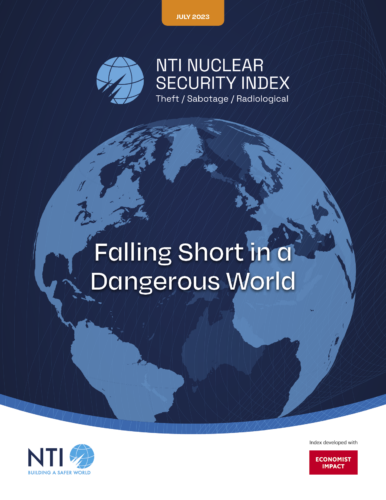We’re falling short on nuclear security at a dangerous time.
See the data
Nuclear terrorism is harder to prevent as threats escalate and evolve. Leaders must act decisively to strengthen nuclear security and protect the planet from catastrophe. Our future hangs in the balance.
Nuclear terrorism is harder to prevent as threats escalate and evolve. Leaders must act decisively to strengthen nuclear security and protect the planet from catastrophe. Our future hangs in the balance.
2023 Overall Scores
The NTI Index assesses nuclear and radiological security conditions in 175 countries and Taiwan. The three nuclear security rankings score countries and areas on a scale of 0 to 100, where 100 is the highest possible score.
See what the NTI Index reveals about nuclear and radiological security in 175 countries and Taiwan.
See the global resultsRecommendations
The data are clear: governments, regulators, industry, international organizations, and NGOs should take action to prevent a nuclear or radiological catastrophe. But what should they do? The 2023 NTI Index has 10 data-driven recommendations.
Restore Forward Progress on Nuclear Security
Nuclear security is regressing in countries and areas with the greatest responsibility for preventing nuclear theft and sabotage—those with nuclear materials and facilities. This destabilizing development occurs as risks are increasing and evolving.
Cap and Eliminate Civil Stockpiles of Separated Plutonium
Civil stockpiles of separated plutonium are growing rapidly, with the biggest increases coming from commercial reprocessing.
Prioritize Nuclear Security in Times of Heightened Risk
Amid increasingly volatile risk environments, many governments are not demonstrating the capacity to meet today’s nuclear security challenges.

